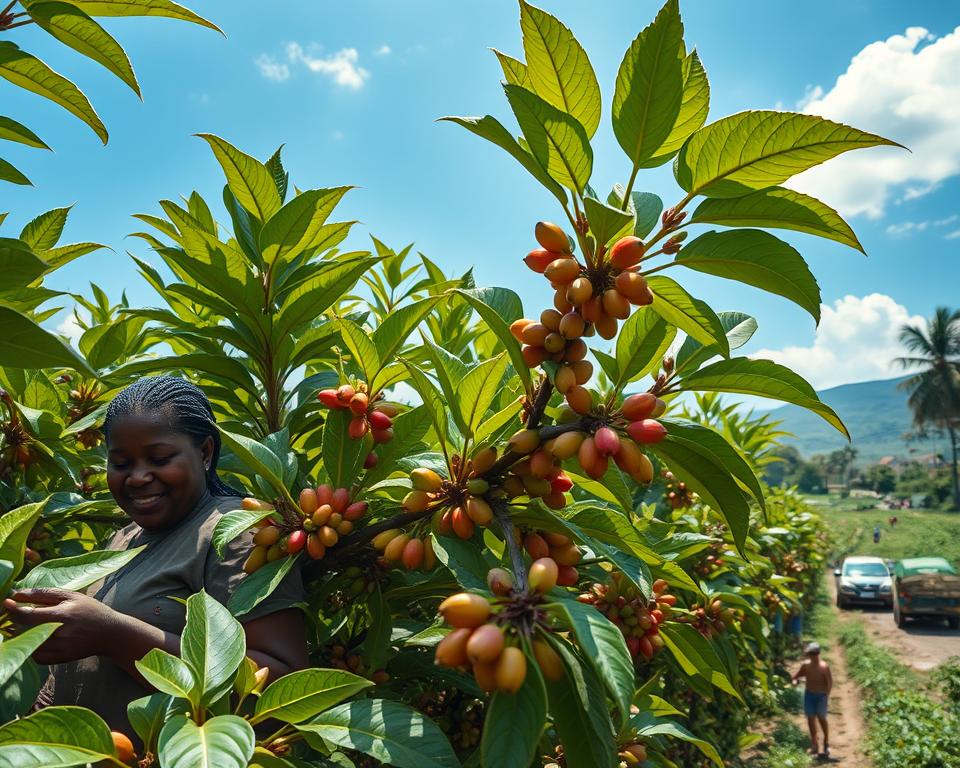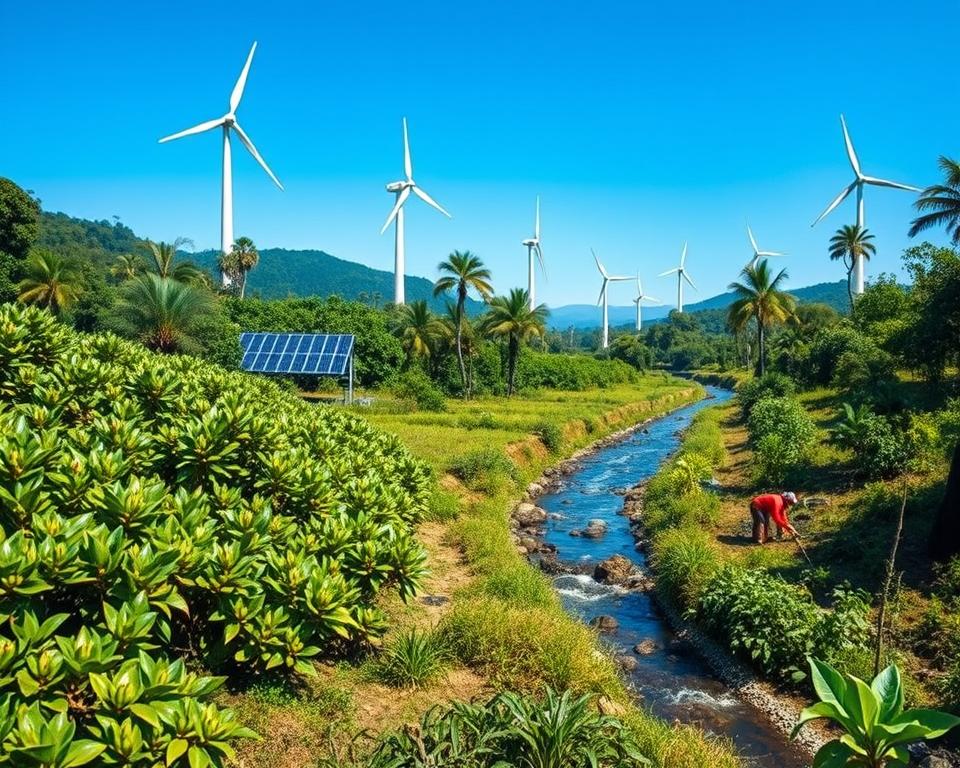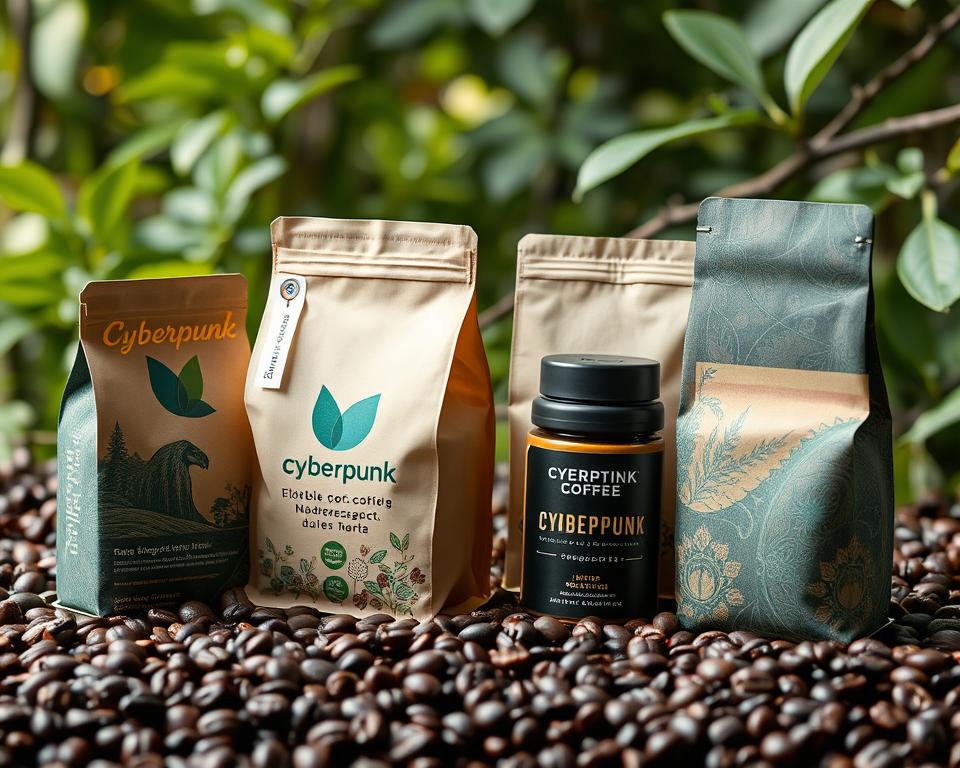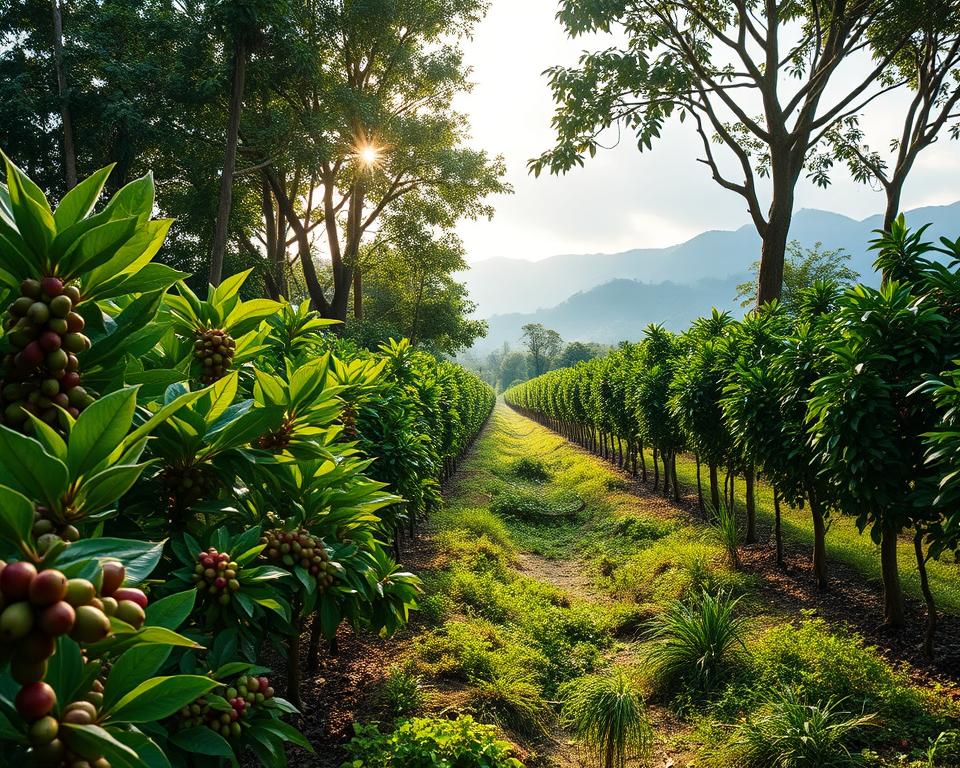If you care about responsible coffee consumption, it’s important to know about sustainable coffee sourcing. Our daily coffee choices impact coffee farmers and the environment. Ethical coffee brands focus on sustainability. They work for social justice and environmental conservation.
Sustainable coffee sourcing is about protecting ecosystems and reducing carbon footprints. It also ensures that workers get fair wages and safe conditions. By choosing ethically sourced coffee, you join a movement. This movement fights poverty and boosts communities.
Certifications like USDA NOP Organic, Fairtrade, Rainforest Alliance, and UTZ have strict coffee production standards. Your coffee then supports the environment and coffee producers. Direct trade lets farmers get better prices and improve their farms.
Choosing ethical coffee brands has a big impact. It protects biodiversity, conserves water, and cuts chemical use. When you pick sustainably sourced coffee, you support fair wages, health services, and education for farmers and their families.
Each cup of ethically sourced coffee helps promote responsible consumption and sustainability in the coffee industry. Let’s raise our cups to a better future. A future better for our planet and the dedication of farmers who give us this beloved drink.
Understanding the Importance of Ethical Coffee Sourcing
Every time we enjoy our daily coffee, it’s key to think about the importance of ethical sourcing. It’s not just the taste, but the journey of each bean. This journey shows the heart of coffee industry social responsibility. It makes sure fair practices and sustainable methods are followed.

Ethical coffee sourcing looks at where and how coffee is made. It highlights issues like sustainability and ethics. Practices like saving water, using fewer chemicals, and protecting biodiversity help ecosystems. For example, growing coffee organically stops deforestation and protects different life forms.
A key part of ethical coffee is fair pay for farmers. Buying ethically sourced coffee often costs more, showing support for better lives and safety for farmers. Companies have a fixed minimum price. Importers often buy directly from farmers and their groups.
Some coffee is grown and processed by women, boosting their role in the industry. This helps ensure profits go to those who really need them. It strengthens the consumer impact on coffee trade.
Adding organically certified coffee shows a promise to sustainable choices. This move reduces carbon emissions by the coffee company. It matches our beliefs as consumers. In fact, 67% of American adults drank coffee yesterday. Choosing ethical coffee supports the environment and social responsibility.
Since 1998, Fair Trade Certified has given over $1 billion to farmers, workers, and fishers worldwide. This shows the big role fair trade plays in social justice in the coffee world. It also shows the wide importance of ethical coffee consumption.
Impact of Sustainable Coffee Sourcing on the Environment
Sustainable coffee sourcing helps our planet through responsible farming. It greatly reduces the environmental impact of coffee. This leads to healthier ecosystems and more biodiversity.
Preserving Ecosystems
Sustainable coffee farming is key to saving natural habitats. It promotes shade-grown coffee, which supports biodiversity and protects wildlife homes. This practice mixes coffee plants with different trees, helping to keep plants and animals safe.
It also prevents soil loss, keeping coffee land healthy for a long time. These steps are critical in reducing coffee’s negative effects on nature.

Eco-friendly farming boosts coffee’s sustainability too. Reforestation and careful water use are very important. These methods avoid using up nature’s resources and keep animal homes safe.
Reducing Carbon Footprint
Sustainable coffee sourcing also cuts down on carbon emissions. It includes using clean energy and reducing waste. These efforts help fight climate change and lessen coffee’s environmental harm.
Buyers have a big part in this too. Choosing brands that value sustainable farming helps the earth. It encourages good changes in coffee production. When more people ask for responsible coffee, it helps everyone.
Studies show that sustainable coffee helps growers live better. It ensures they get fair pay and access to education. This supports lasting sustainable methods. The Rainforest Alliance Certification shows how certification helps in ethical coffee sourcing.
Fair Trade and Direct Trade Coffee: What’s the Difference?
Looking into fair trade versus direct trade coffee shows us their unique benefits and limits. Both aim for clear and ethical trading. Still, they do so in different ways, affecting coffee producers differently.
Fair Trade Certification
The advantages of fair trade certification are clear. It promises fair pay, safe workplaces, and cares for the environment. Farmers are paid a set minimum price, which helps them have a steady income. This approach helps groups of farmers work together for better deals and community growth. Yet, getting certified is hard and costly for small farmers. This may limit their chances and gains from the market.
Direct Trade Benefits
Direct trade means buying straight from coffee growers, cutting out the middlemen. It leads to fair pay and better insights into how farms operate. Coffee makers work closely with farmers, focusing on bean quality. This pushes for farming that’s good for the planet. Farmers also get better prices thanks to this focus on quality.
Even though interest in fair and direct trade coffee is small, it helps. Choosing them backs moral supply chains and improves the lives of farmers. It also supports taking care of our planet. Both methods strive for a fairer coffee market, considering farmers’ needs, eco-care, and honesty.
Farmer Welfare and Sustainable Coffee Production
Successful sustainable farming helps farmers a lot. Around 25 million coffee producers worldwide face climate change challenges. As more people want ethically sourced coffee, it’s vital to pay coffee farmers well and give them what they need for their farms.
Ensuring Fair Wages
The Coffee and Farmer Equity Practices (C.A.F.E.) program started in 2004. It’s very important for farmer welfare. This program works with over 400,000 farmers in 30 countries to make sure they get fair pay. Starbucks has given more than $150 million to help coffee farmers and their communities in 20 years. They also plan to give farmers 100 million coffee trees that resist disease by 2025. This helps farmers make more money and improves farm resources.
Access to Resources and Technology
Technology is key for better and greener coffee production. Starbucks’ Farmer Support Centers help over 31,000 people around the world as of FY22. These centers teach farmers how to use less water in coffee processing, cutting it by up to 80% in some countries. Also, Starbucks’ Hacienda Alsacia in Costa Rica works on new ways to farm coffee sustainably.
When we buy certified and sustainable coffee, we help improve farmers’ lives. This also pushes for greener farming methods. In the end, it means our coffee is made right and is better for the planet.
Role of Certification Programs in Ethical Coffee Sourcing Practices
Coffee certification programs are key in promoting ethical coffee production. Programs like Fair Trade USA, Rainforest Alliance, and Starbucks® C.A.F.E. Practices set sustainability standards. For example, Fair Trade USA has strict criteria for social and environmental fairness.
These programs give consumers confidence about their coffee’s ethical background. The labels show the coffee meets standards for fair pay and farming practices. This transparency helps consumers support sustainable coffee production by making informed choices.
Yet, these certification programs face challenges. The cost of certification is high for many small coffee farmers. This makes it hard for them to participate, even if they meet the standards. Also, these programs constantly need to improve to ensure coffee truly meets ethical and sustainability claims.
Certifications matter a lot in regions like Africa, South East Asia, and Central and South America. These areas produce much of the world’s fair trade coffee. They bring benefits like better pay and encourage sustainable farming. For instance, Starbucks® C.A.F.E. Practices helps in over 30 coffee-producing countries to support ethical sourcing.
Coffee certification programs do more than ensure quality; they promote sustainability in the coffee industry. Through strict guidelines and audits, they help make coffee sourcing more ethical. This benefits producers and consumers alike by fostering a culture of sustainability.
Community Empowerment through Sustainable Coffee Initiatives
Sustainable coffee initiatives play a key role in community empowerment. They bring more than just environmental benefits. These efforts improve the socio-economic conditions of communities.
Fair trade practices help coffee farmers earn fair wages. This improves their living conditions. It also helps with the development of education, healthcare, and infrastructure in their communities.
Sustainable coffee focuses on quality, not just quantity. This ensures better tasting coffee. It also boosts the economy of coffee-producing areas.
As consumers, we have an important role too. Choosing brands that support sustainable practices can lead to positive changes. This helps improve the lives of farmers and strengthens their communities.
Supporting these sustainable efforts leads to a brighter future. By choosing fair and eco-friendly coffee, we contribute to a cycle of good. This benefits both people and the planet.
Understanding Your Role as a Consumer
As consumers, we have a big say in how coffee is sourced through our buying choices. By choosing ethical coffee options, we boost the demand for products that value worker fairness and eco-friendly farming. This is about picking informed coffee buys that reflect our principles and support sustainable consumption goals.
When we pick coffee that’s ethically sourced, like those certified by Fair Trade USA or Fairtrade International, we help farmers. These labels ensure fair pay, no child labor, and green farming. They allow growers to better their communities and future.
Brands such as NESCAFÉ are also doing their part by buying more responsibly sourced coffee, hitting 75% of their global needs. In Australia, NESCAFÉ ensures all their coffees are from 100% responsibly sourced beans. This shows the weight consumers have in pushing for ethical sourcing.
Traceability is another crucial point. Ethical companies, like Dublin Roasters, make sure their coffee can be tracked back to the source farms. This transparency lets us know that our coffee supports ethical and sustainable farming.
We must understand our influence as buyers. By opting for informed coffee selections and demanding ethical coffee options, we encourage a market that values sustainable consumption. Our choices can make a big difference for the environment and coffee farmers across the globe.
How Do Coffee Certifications Reflect Ethical Sourcing Practices?
Coffee certifications serve as vital indicators of ethical sourcing practices, ensuring that producers adhere to environmental and social standards. By examining their stipulations, consumers can make informed choices. For those new to the subject, a coffee certification explained clearly can illuminate the positive impacts of conscious coffee consumption on communities and ecosystems.
Conclusion
In discussing ethical coffee sourcing, we see its key role in a sustainable coffee world. This process touches everyone from the 125 million workers to the 12.5 million farmers involved. By focusing on ethics and sustainability, we spread positivity beyond just our morning cup.
Consumers hold big power in their choices. Picking ethically sourced coffee fights poverty and helps over 5.5 million poor coffee farmers. It also aims to solve the problem of 2 million children working in coffee fields. By buying directly, we can greatly help farmers earn more and improve their farming ways.
The cooperative model shows how teamwork between governments, farmer groups, certifiers, and coffee companies is vital. This approach is making sustainable coffee more popular. Our choices can improve farmers’ lives, make our coffee taste better, and bring health benefits. Let’s keep choosing ethically sourced coffee for the good of all.
FAQ
What is ethical coffee sourcing?
Ethical coffee sourcing means buying coffee in a way that respects people and the planet. It includes paying fair wages to farmers and providing safe places to work. It also means taking care of the environment and helping communities grow.
When consumers pick ethical coffee brands, they help make the coffee world a better place. They also encourage the rest of the industry to act responsibly.
Why is ethical sourcing important in the coffee industry?
Ethical sourcing matters a lot in coffee. It makes sure farmers and workers are treated well and that the environment is protected. Also, it helps keep the coffee supply chain honest and transparent.
When people buy ethically sourced coffee, they push for positive changes. This means a fairer and more sustainable coffee industry for everyone.
How does sustainable coffee sourcing help the environment?
Sustainable coffee sourcing is great for our planet. It encourages methods that save water and reduce harmful chemicals. Also, it helps protect many plant and animal species.
By farming coffee this way, we can also cut down on carbon emissions. This is all about making coffee farming friendlier to the earth.
What are the differences between Fair Trade and Direct Trade coffee?
Fair Trade and Direct Trade both aim to make coffee sourcing better, but in different ways. Fair Trade focuses on fair pay and safe workplaces. It also cares a lot about protecting nature.
Direct Trade is about roasters or importers working straight with farmers. This means more clear deals and better earnings for farmers. Both ways are about making sure everyone gets a fair share.
Why is farmer welfare crucial in sustainable coffee production?
Taking care of farmers is key to making coffee farming last. Good wages, resources, and safe conditions mean happier lives for farmers. This leads to steady coffee supply and better protection for our environment.
These efforts keep farms up and running well into the future. They also make sure coffee lands stay healthy and productive.
What role do certification programs play in ethical coffee sourcing?
Certification programs set the rules for making coffee in a good way. They focus on honest deals, taking care of the land, and fair treatment of workers. These badges of honor tell customers their coffee comes from a good place.
Look for seals like USDA NOP Organic, Fairtrade, and Rainforest Alliance. They mean your coffee helps support good practices in farming and trade.
How do sustainable coffee initiatives empower communities?
Sustainable coffee projects do more than just improve coffee farming. They help whole communities by offering better trade deals, education, and health services. Projects also build things like schools and roads.
These projects help people build a stronger future. They teach communities how to grow and stand on their own.
What can I do as a consumer to support ethical coffee sourcing?
Your coffee choices make a big difference. Choosing coffee that’s sourced ethically supports a healthier planet and fair work. It encourages the coffee world to be more ethical.
Buying responsibly sourced coffee sends a message. It pushes for more goodness and fairness in how coffee comes to us.




